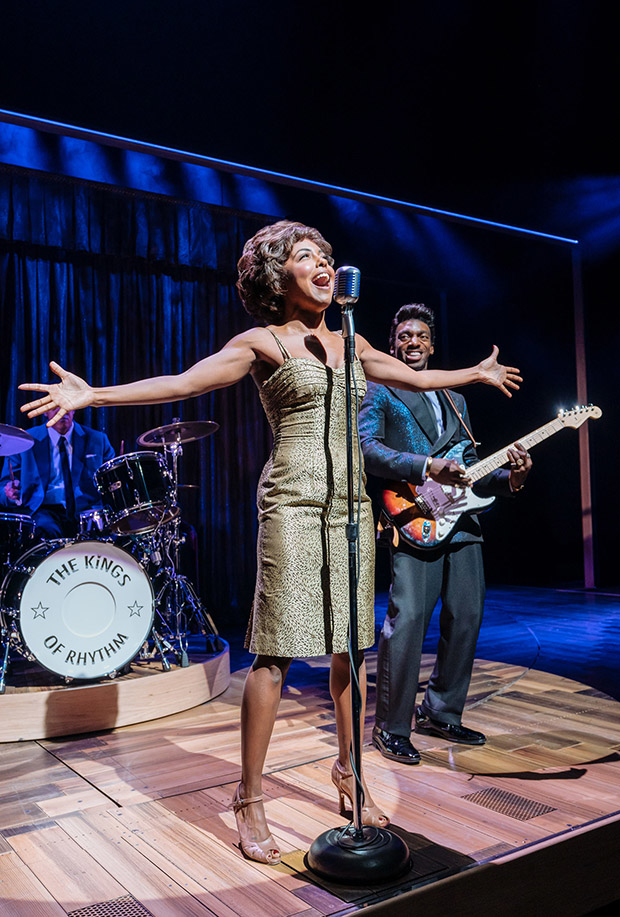Adrienne Warren Tells Us What It Takes to Play Tina Turner on Broadway
This Tony nominee is no longer afraid of fear, and here’s why.
Seeing Adrienne Warren play Tina Turner on Broadway, you'd never know she was afraid.
"I've never been comfortable in any of my jobs," Warren says, despite a growing collection of high-profile gigs and subsequent award nominations. In 2016, she earned a Tony nod for playing two real-life performers, Gertrude Saunders and Florence Mills in Shuffle Along, and just this past March, she earned an Olivier nod for her title performance in Tina: The Tina Turner Musical in London.
Shuffle Along presented one set of challenges: insanely complex Savion Glover choreography combined with a need to build distinct 1920s-style voices for her dual roles. Tina has its own unique hurdles. Warren is onstage for nearly all of the show's two hours and 45 minutes, and she must not only channel the music icon through song, dance, and big hair, but also infuse her with an incredible amount of strength in the face of seemingly insurmountable adversity.
And yet, as Warren sees it, Tina is the culmination of the work she's done since she landed on Broadway in Bring It On in 2011. "Every part of my career has been a step toward Tina, because every time I've been on Broadway, I've done something I've never done before in my life." The fear, though, is always present, however different now. "I would never say I'm fearless, but I'm no longer afraid of fear," she says of this experience. "I'm excited and challenged by it. I know if I fall down, I'm gonna get back up."
Just like Turner herself.

(© Manuel Harlan)
Your performance is crazy. What is your life like in order to be ready for six super-intense shows a week?
That's the question! [laughs] I have a lot of help and I get a lot of rest. I have a phenomenal trainer, Michael Olajide Jr., who I work with on boxing and getting my stamina and strength up. I have a voice coach, my voice whisperer, Liz Caplan, who I meet with every single week. I have an incredible wellness team that helps me stay healthy. When I say it takes a village, it's absolutely true.
Your vocal resemblance to Tina is uncanny. How did you go about developing that voice, and was it similar to the process you used for Shuffle Along?
I was lucky. I sang rock-and-roll before I did theater and toured with a rock-and-roll band in college. I've always had that muscle in my voice, but not a lot of people were aware of that because I've never had the opportunity to explore it onstage.
With Shuffle Along, I was trying to find a voice that was not recorded in history. It was terrifying to somehow create that out of nothing. [Director] George C. Wolfe and [musical director] Daryl Waters and I worked on trying to discover that voice for hours at a time in a studio with just a piano. I think because I had that experience, it helped me in trying to develop voices for roles like this.
By now, I'm sure you've had many conversations with Tina about her life and work. What are some of the questions you've asked her, and what kind of advice has she given you?
I asked her many things about herself as a performer and as a person, in the sense of…"What did you eat?" And she would say, "I ate a big breakfast, and then I would snack during the day, and I wouldn't eat before performances." So I don't really eat dinner before performances, but I'll snack on nuts or granola bars or protein, and then eat dinner after the show.
One of the first things Tina said to me, which captured it all, was "There are no shortcuts to hard work." She would rest whenever she could, but it wasn't often. I remember on days when I feel tired that I'm just telling this story and she actually lived this. Somehow, that really lights a fire under you. She was there living this life that had some tumultuous chapters to it and was able to come out on the other side with light and love, and, for so many years, was able to perform with so much pressure on her. Doing a Broadway show seems simple after that.

(© Manuel Harlan)
Some of the Tina-Ike scenes are very violent. What kind of psychological toll does that take on you? Or are you able to turn it off after the show?
I'm able to turn it off, because I've done the show for a while now. Your relationship with Ike offstage is very crucial. I was very close with Kobna Holdbrook-Smith, who played Ike in London. He is a unicorn of a human being and the sweetest man on earth. Daniel Watts, who plays Ike on Broadway, has been a brother to me in this community for about 10 years. That trust is so needed. If you don't have that, it can be very dangerous. It looks rough, but I feel so safe whenever Daniel is onstage with me.
What's the takeaway from this experience? What do you want the audience to feel after they've seen the show?
You walk away having learned so much about Tina as a woman, as a mother, as a sister, as a granddaughter, as a daughter. That's the part of her life that people aren't as aware of. If you could walk away from the theater knowing a little more about her as a human being, then we've done our job.

(© Manuel Harlan)







